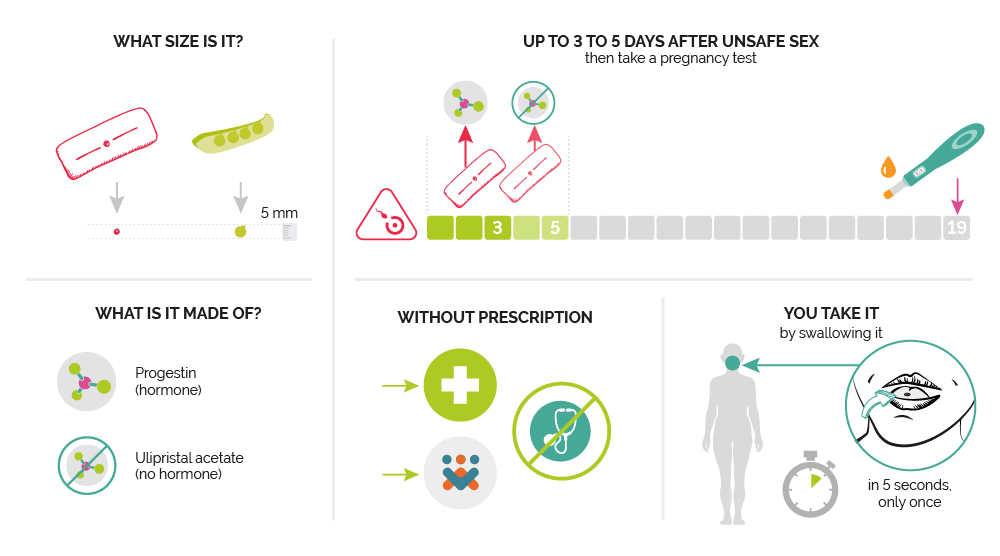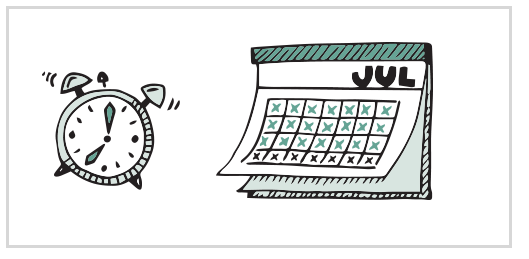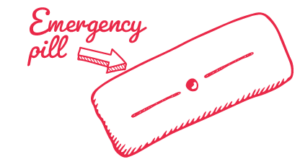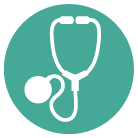The emergency pill
Emergency contraception, also known as “morning-after” pill is taken following an unprotected sexual intercourse.
HOW DOES IT WORK?
The emergency pill, also known as the ‘morning-after pill’, is taken after unsafe sex. The effectiveness of the emergency pill decreases with time: the sooner it is taken after risky sex, the more effective it is likely to be. It also depends on the time of ovulation and the type of pill:
- The levonogestrel pill (Norlevo ©) that can be taken up to 72 hours (3days) after the risky sexual intercourse. It contains levonogestrel, a progestin hormone.
- The Ulipristal acetate pill (EllaOne ©) that can be taken up to 120 hours (5 days) after the risky sexual intercourse. It contains ulipristal acetate, a substitute of progestin. It is not a hormone.
The emergency pill works by delaying or inhibiting ovulation. It no longer has any effect if fertilisation has occurred.
Please note: the emergency pill delays ovulation, but does not stop it. This means that subsequent sexual intercourse must be protected (for example, by using a condom) for ten days.
The emergency pill may cause some side effects, such as nausea, headaches or even a disturbance of the menstrual cycle (irregular bleeding).
It is also possible to have a copper IUD inserted within five days of reporting the risk. For more information, see our “Emergency Copper IUD” page.
INTERESTING FIGURES AND DETAILS

HOW TO USE IT ?

Context
You had a sexual intercourse without contraception or in case of contraception’s failure (forgotten, doubt, wrong use, or contraceptive accident). When should you take an emergency contraceptive?
Step 1
Go as soon as possible to a pharmacy or at the Planning Familial to receive advice on emergency contraception that suits the situation.
Step 2
The effectiveness of the pill depends on how quickly it is taken. The emergency pill needs to be taken as quickly as possible after the intercourse (max 5 days).
Step 3
If you usually take a hormonal contraceptive (patch, ring, combined pill, or Minipill), keep using it as planned. For every question on this topic, you can ask your physician or gynaecologist.
No matter what contraception you use, if you have sexual intercourse in the days following the emergency contraception intake, use a condom in addition during the 10 following days.
And afterwards
If you throw up within 3 hours following the pill intake, take another one. It is advisable to take pregnancy test at least 3 weeks after taking emergency contraception. If the test is positive, a Voluntary Termination of Pregnancy (VTP, also called an abortion) can be performed.
If an STI screening has not been done for a long time, it is recommended to ask for it at your physician, gynaecologist or at the Planning Familial.
WHERE TO GET IT?
Starting 1 April 2023, this contraceptive is delivered free of charge WITHOUT a medical prescription in any Luxembourg pharmacy to anyone affiliated with the National Health Fund, with no age limit.
For more information: click here.
This contraceptive can also be delivered for free at the Family Planning, including to people not covered by the National Health Fund.
Emergency contraception costs between 10€* (Norlevo©) and 25€* (EllaOne©).
*(The price is an average indication which may vary)

La pilule d’urgence
Can repeated use of the emergency pill make you infertile?
No, the emergency pill is not dangerous for your health and does not make you sterile nor infertile. It can cause a hormonal imbalance, and generate some temporary side effects like:
- Dizziness, headaches
- Nausea, abdominal pain
- Feeling of breast tension, delayed menstruation, heavy menstruation, bleeding, pain in the uterus
- Muscle cramps, back pain, fatigue
- Painful periods
- Diarrhea,
- Vomiting Be careful, if you vomit within 3 hours of taking an emergency pill, you should take another one, as the hormones in the pill will not have had time to be absorbed by the body before being expelled.
If you have any concerns about taking an emergency pill, do not hesitate to contact a physician, gynaecologist, pharmacist, Family Planning or any other health professional. You can also always refer to the information leaflet of the emergency pill.
Emergency pill, morning-after pill, plan B, is there a difference?
It may seem confusing to talk about emergency contraception. Although there are many ways to talk about it, here are the 3 types of emergency contraception that exist:
-
- The copper IUD, which can be inserted up to 5 days (120 hours) after risky sex
- The Ulipristal acetate pill (EllaOne©), which can be taken up to 5 days (120 hours) after risky sexual intercourse.
- The Levonogestrel pill (Norlevo©), which can be taken up to 3 days (72 hours) after risky sexual intercourse.
How effective is it?
The emergency pill should be taken as soon as possible after unprotected sex. The longer you wait to take it, the less effective it becomes. Its effectiveness depends on several factors, including:
-
- When you take the emergency pill;
- The time of the cycle during which the risky intercourse took place (related to ovulation);
- Whether or not you are already using contraception;
- Weight;
- Taking certain medications (e.g. certain anti-epileptic drugs, antiretrovirals, etc.).
There are 2 emergency pills:
- The Ulipristal acetate pill (EllaOne©), which can be taken up to 5 days (120 hours) after risky sex. Overall, this contraception is more effective. It prevents between 67% and 100% of pregnancies3.
- The Levonogestrel pill (Norlevo©), which can be taken up to 3 days (72h) after risky sex. Overall, this contraceptive is less effective than Ulipristal acetate, with an effectiveness ranging from 52% to 100%.
For any information, please do not hesitate to inform or ask your physician, gyneacologist or pharmacist!
Does emergency contraception contain hormones?
- The copper IUD does not contain any hormones.
- The Norlevo© pill contains levonogestrel, a synthetic (artificial) hormone called progestogen.
- The EllaOne© pill contains ulipristal acetate. It is not a hormone but will take the place of progesterone at the body’s receptors, thus preventing progesterone from being integrated and having its usual effect.
Does weight affect the effectiveness of the emergency pill?
There are two emergency pills. For both of these pills, the latest studies in the field indicate a decrease in the effectiveness of these pills in overweight women. If you are in this situation, it is advisable to use a copper intrauterine device (IUD), which can also be used as an emergency contraceptive and whose effectiveness does not depend on weight.
As the Norlevo© pill can be taken up to 3 days (120h) after risky sexual intercourse, the effectiveness is reduced for people with a body mass index >30kg/m2 (weight in kg/height² in m).
With regard to the EllaOne© pill, which can be taken up to 5 days (120 hours) after high-risk intercourse, current data show a slight decrease in effectiveness in overweight women.
I forgot to take my pill, should I take the emergency pill?
The procedure depends on whether you are taking the combined or mini-pill.
With the combined pill, you are no longer protected if you forgot to take it for more than 12 hours. If you have had sexual intercourse on the day you forgot to take the pill and/or in the previous 5 days, consult a health professional to find out what to do. You may need to take an emergency pill. Until then, continue to take the pill, and if you have sex, use additional contraception (e.g. external or internal condom).
With the mini-pill, you are no longer protected if you forgot to take it for more than 3 hours. Take the forgotten pill as soon as possible, even if you take two pills at the same time and on the same day. Please note that some mini-pills tolerate a 12-hour delay as the combine pill. Refer to the instructions of your pill or ask your pharmacist or physician for more information. If you have had sexual intercourse on the day you forgot to take the pill and/or in the 5 days preceding the day you forgot to take the pill, consult a health professional. You may need to take an emergency pill. Until then, continue to take the pill, and if you have sex, use a condom.
What are the side effects of the emergency pill?
The cycle may be disrupted, so your period may come earlier or later. You may also experience headaches, nausea and dysmenorrhea (pain around the time of your period).
Note that if you vomit within 3 hours of taking the emergency pill, you must take another one. It may therefore be useful to buy two emergency pill packs.
If hormonal methods of contraception are contraindicated for me, can I still take the emergency pill?
Yes, emergency pill contains progestative, a hormone for which there are very few contraindications. Moreover, it is an “over-the-counter” product (that does not require a prescription). If you have any questions on this subject, please contact your physician or pharmacist.
Can the emergency pill interrupt an ongoing pregnancy?
No. The emergency pill does not work if you are already pregnant. If you want to continue the pregnancy and you take the emergency pill, it will not affect the pregnancy. If you do not wish to continue the pregnancy, you will have to go to a gynaecologist to discuss voluntary termination of pregnancy (abortion).
If I get my period after taking an emergency pill, does that mean that the pill worked and I am not pregnant?
The only reliable way to know if your emergency pill has actually prevented a pregnancy is to take a pregnancy test 19 days after the risky sex.



